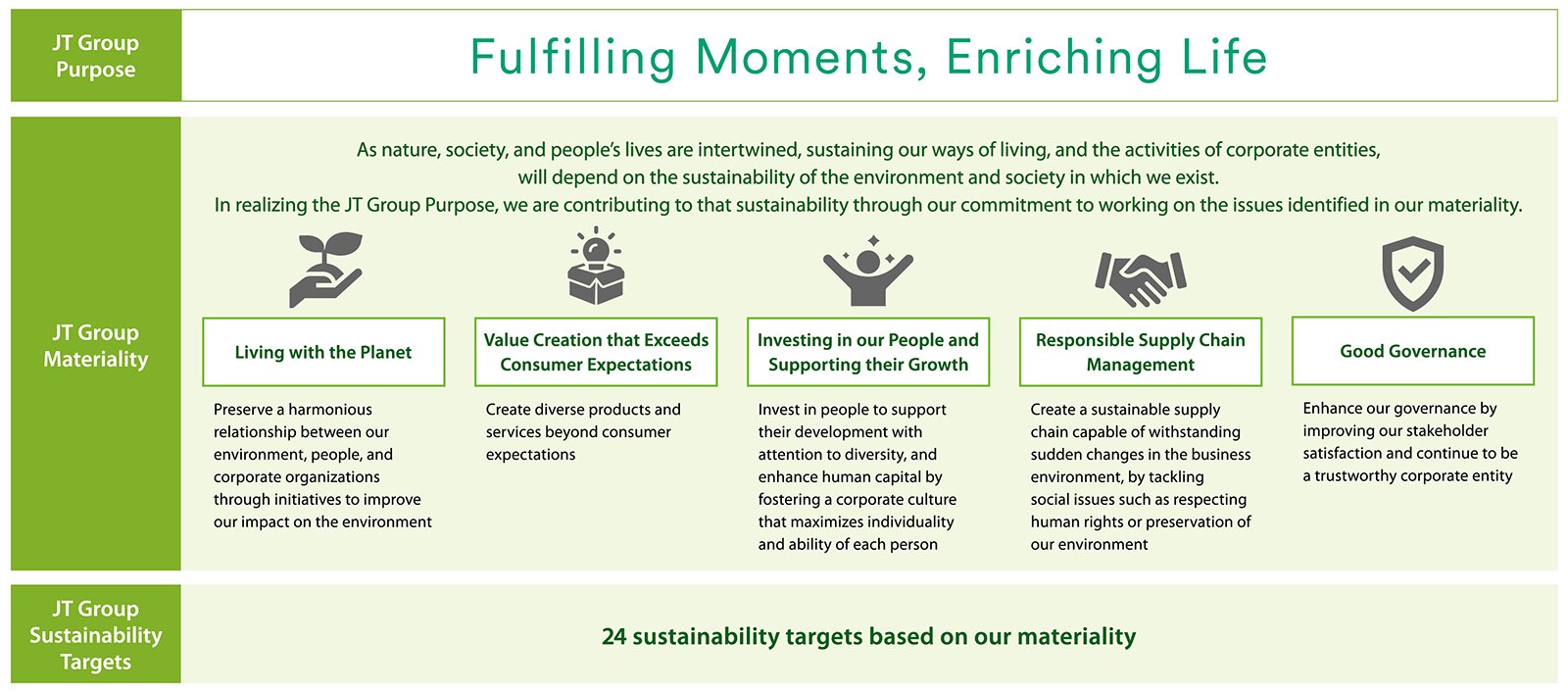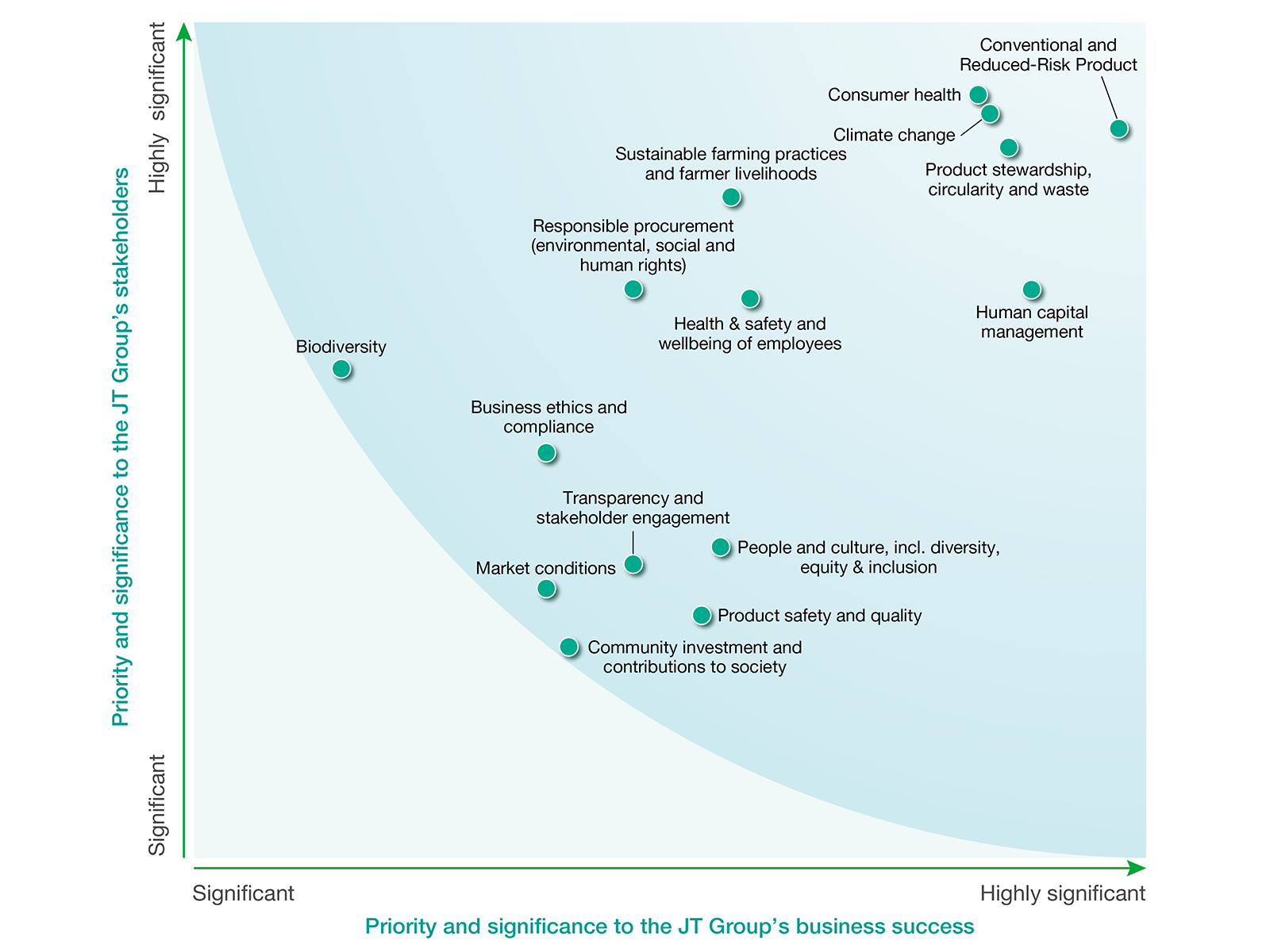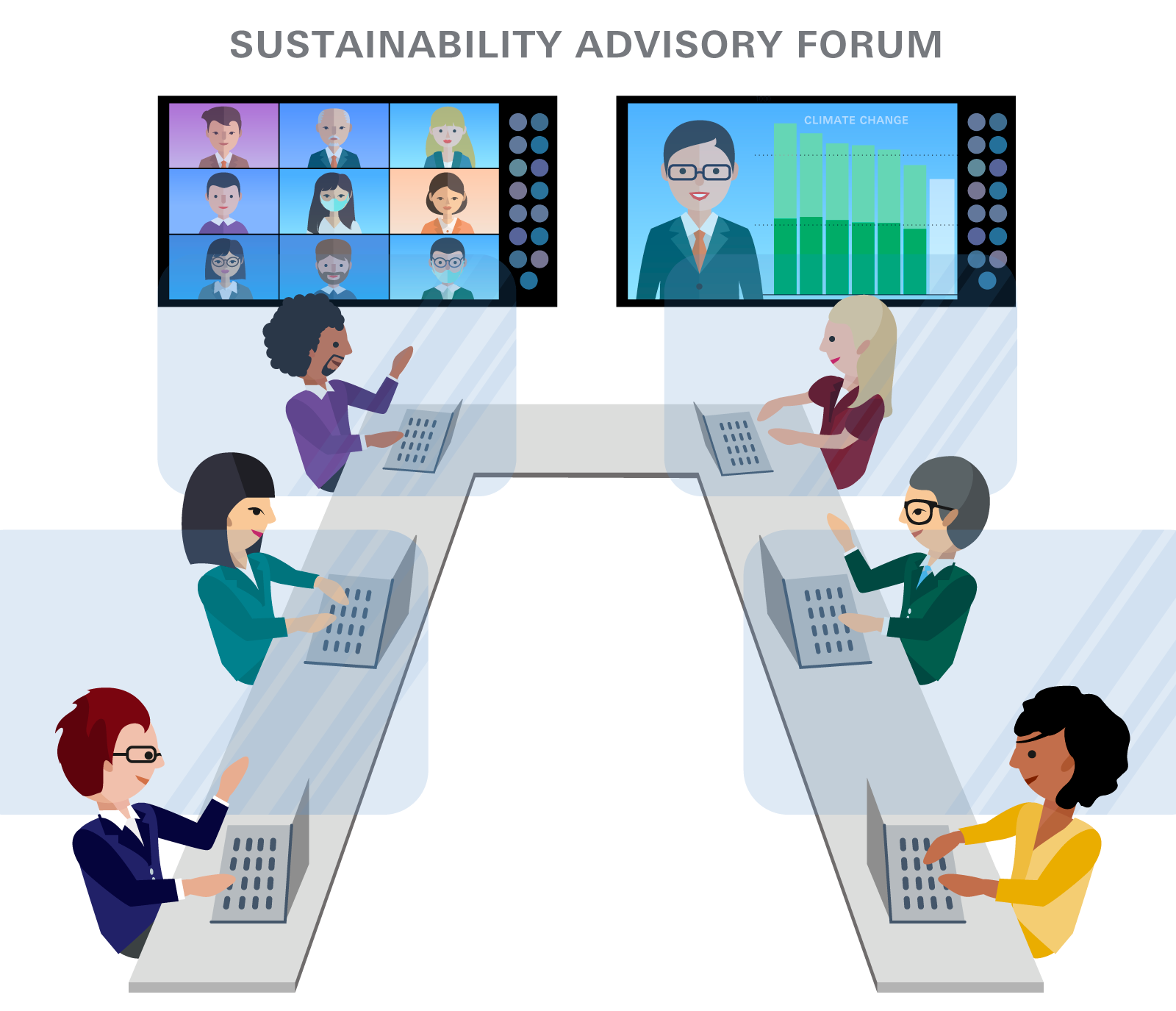- As with our original matrix, we first set out the materiality matrix of our business, which was subsequently expanded to include the entire Group.
- We visualize the individual material topics by plotting priorities of significance to and impact on our stakeholders on the vertical axis and priorities of significance to and impact on our Group’s long-term business on the horizontal axis.
The JT Group Materiality and Sustainability
Overview
In order to ensure the sustainability of our society and the business of the JT Group within it, the JT Group has created the JT Group Purpose, which sets out the direction the JT Group should take.
The Group’s management principle is to pursue the 4S model. As nature, society and people’s lives are intertwined, sustaining our ways of living, and the activities of businesses, will depend on the sustainability of the environment and society in which we exist. We recognize that our strive to achieve sustainability for nature, society and our group’s business within, is fundamental to the management of our Group. On this note with the JT Group Purpose as the starting point, the JT Group Materiality were identified, setting out five groups of materiality as priority material issues for the Group.
Furthermore, we have formulated the ‘JT Group Sustainability Targets’, consisting of a total of 24 items of targets and initiatives to drive our sustainability performance. Our Board is involved in setting and managing the sustainability strategy while the targets are reviewed and assessed on a regular basis.
We are strongly committed to the sustainable growth of our society and the Group’s business within it. Through our sustainability strategy, we will continue to provide value in order to realize the JT Group Purpose “Fulfilling Moments, Enriching Life.”

Read more about the JT Group Sustainability Targets and FY2024 results
The JT Group Materiality
We started our materiality assessment in 2013, and in 2015 for the first time through interviews with our external and internal stakeholders, we completed our original materiality assessment to cover the entire JT Group.
Since we selected our original materiality, external circumstances and the business environment in which we operate have changed. In 2021, we began updating the Group’s materiality framework and reported about the revised materiality in the 2022 Integrated Report. By identifying and analyzing our materiality topics through interviews with internal as well as external stakeholders, we have selected and prioritized our materiality topics and updated the materiality matrix accordingly. We then organized the material issues of the Group into 5 groups to set out the JT Group Materiality.
Our materiality is based on the concept of double materiality, taking into account the significance to and impact on our stakeholders and the society, and the significance and impact to the JT Group for sustainable growth. The whole process was conducted in accordance with the advice of an external consultant.
Updating the materiality matrix - the process
In revising our materiality, a project team was formed comprised of members responsible for sustainability strategy and Enterprise Risk Management (ERM). External advisers were also part of the project team. In identifying materiality topics, ERM risk factors were fed into the short-list of potential material issues, which were then adjusted during the analysis process. A cross-check was also performed between ERM risk factors and the final short-list of material issues. The project team presented a revised draft materiality, which was then approved by the JT Board of Directors.
The JT Group Materiality was updated through the following four phases.
Phase 1: Identifying materiality topics
- Identify topics that may have impact on the sustainable growth or sustainability challenges of our Group, bearing in mind the changes in our external operating environment and the business challenges.
- Identify topics by researching and analyzing a wide range of information including but not limited to sustainability disclosure standards or framework such as SDGs, SASB or GRI, risk factors found through our ERM* process, or materiality of our competitor firms, among others.
- * For sustainability and risk management, please also refer to the 40th Annual Securities Report
Phase 2: Stakeholder interviews and desktop searches
- Integrate internal and external stakeholder opinions by conducting interviews and surveys, using the topics identified in the phase 1 process.
- Prioritize the topics for our external and internal stakeholders through desktop analysis of information issued by external rating agencies, global mega-trends or media reports, ensuring there are no gaps and that all relevant topics have been included.
- Conduct interviews with a wide range of stakeholders to maintain quality of the materiality assessment, bearing in mind that the priority of materiality topics may vary depending on the individual stakeholder.
Track record of stakeholder interviews, surveys
- Primarily senior vice presidents of corporate and business functions of the Group:
119 SVPs or others in similar positions - Suppliers, customers, NGOs, other external parties: 27 cases
- Investors, banks: 38 cases
- Employees and others: Approximately 450 cases
Phase 3: Plotting the matrix and prioritizing

Phase 4: Identifying the issue groups
Selecting priority topics or issues for the JT Group as well as for our stakeholders for sustainable growth of the Group and our society. Then arranging the topics into five groups with similar issues or expected effects, namely, preserving our environment, product and services, people, supply chain management and governance.
Reviewing the Group Materiality
By the end of the 1st half of 2024, we had performed an annual review of the JT Group Materiality, taking advice from external consultants and advisers, in view of setting and updating the JT Group Sustainability Targets. By the end of July 2025, we had performed another annual review of the JT Group Materiality. We took advice from external advisers and examined macro trends through desk-top searches to see if there are any drastic changes in our business environment in comparison to the prior year. We crossed-check these external factors against the state of our own business or our strategy, to see if it would be necessary to update any of the 5 groups of materiality or each of the material topics on the materiality matrix. We plan to perform annual review of our materiality, as well as the sustainability targets set on the basis of our materiality.
Sustainability Advisory Forum
Discussions at the forum are appropriately reported to the CEO and Board of Directors.
